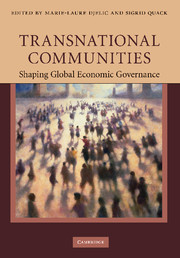Book contents
- Frontmatter
- Contents
- List of figures
- List of tables
- List of appendices
- Contributors
- Preface
- Part I Introduction
- Part II Classical communities with a transnational extension
- Part III Professional communities with a transnational extension
- Part IV Virtual communities
- Part V Transnational interest- or issue-based communities
- 11 The transnational temperance community
- 12 Industrial democracy in the European Community: trade unions as a defensive transnational community, 1968–1988
- 13 The making of a comprehensive transnational discourse community trade unions as a defensive transnational community, 1968–1988
- 14 Global warming, transnational communities, and economic entrepreneurship: the case of carbon capture and storage (CCS)
- 15 Communities of practice as cause and consequence of transnational governance: the evolution of social and environmental certification
- Part VI Conclusion
- Index
- References
13 - The making of a comprehensive transnational discourse community trade unions as a defensive transnational community, 1968–1988
Published online by Cambridge University Press: 07 September 2010
- Frontmatter
- Contents
- List of figures
- List of tables
- List of appendices
- Contributors
- Preface
- Part I Introduction
- Part II Classical communities with a transnational extension
- Part III Professional communities with a transnational extension
- Part IV Virtual communities
- Part V Transnational interest- or issue-based communities
- 11 The transnational temperance community
- 12 Industrial democracy in the European Community: trade unions as a defensive transnational community, 1968–1988
- 13 The making of a comprehensive transnational discourse community trade unions as a defensive transnational community, 1968–1988
- 14 Global warming, transnational communities, and economic entrepreneurship: the case of carbon capture and storage (CCS)
- 15 Communities of practice as cause and consequence of transnational governance: the evolution of social and environmental certification
- Part VI Conclusion
- Index
- References
Summary
Introduction
The critique of state-centered approaches to international relations and international political economy has resulted in a rapidly growing literature focusing on a variety of “private authorities” in international relations (Cutler et al. 1999). In this literature, arrays of transnational communities are prominent subjects of analysis. Epistemic communities promoting new environmental standards, discourse communities pushing for new public management across borders, and advocacy coalitions shaming the perpetrators of human rights abuses, for example, have been observed and conceptualized in order to shed light on the extent to which dispersed actors from diverse locations can build and maintain crucial links, and develop social identities across borders. In turn, these have been found important for setting political agendas, acquiring a voice in policy implementation processes, policing compliance, and spreading ideologies more generally (Haas 1992a; Keck and Sikkink 1998; Bislev et al. 2002; Djelic 2006). At the same time, it is becoming clear that many of these transnational communities recruit their members among private as well as public constituencies. A study of these communities thus also needs specifically to address the linkages between civil society, business, and the public sphere.
Transnational community research has also contributed to the rise of social constructivist approaches in international relations (Risse 2007). However, given the increasing attention paid to knowledge, ideas, and discourse, it is surprising how little international relations scholarship in general, and transnational community research in particular, have had to say so far about the global rise of neoliberal discourse.
- Type
- Chapter
- Information
- Transnational CommunitiesShaping Global Economic Governance, pp. 305 - 326Publisher: Cambridge University PressPrint publication year: 2010
References
- 2
- Cited by



